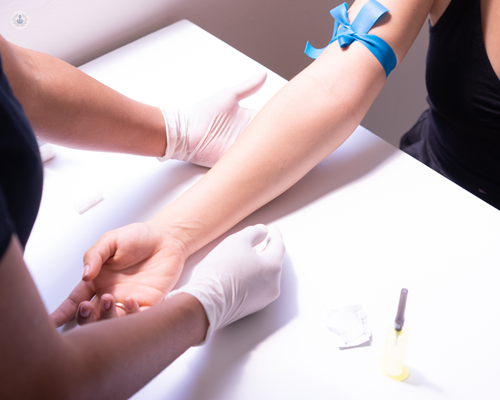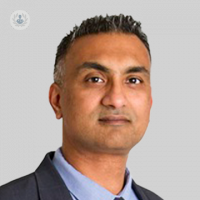Ovarian cancer prevention
Written by:A significant number of women and their families are affected by ovarian cancer every year in the UK. Having the knowledge about what to look for is a step towards prevention or early diagnosis, which can lead to more effective treatment.
Esteemed gynaecologist Mr Saurabh Phadnis has expert advice and reassurance for patients wanting to learn more about the condition and what’s involved in minimising the risks of developing ovarian cancer.

How is it screened?
Ovarian cancer doesn’t have a reliable test. There is no national screening programme at present, however, the recent UKCTOC trial was the largest randomised trial in screening for ovarian cancer. It involved multimodal screening involving blood tests and transvaginal ultrasound. Another method that can determine risk of ovarian cancer, rather than the cancer itself, may assist alongside appropriate counselling and prevention work.
Is it advisable for women to take preventative measures to best protect themselves? Why is this important?
Prevention can be offered for certain individuals who have a genetic link to ovarian cancers, at an appropriate time. It is individualised and should be offered after careful consideration.
A surveillance strategy can be formulated based on the determination of the risk of ovarian cancer, and prevention is usually via surgery. This procedure removes the fallopian tubes and ovaries but it has to be timed appropriately to avoid adverse effects of the menopause.
What do you advise women to do if they have a query regarding ovarian cancer?
Seek specialist advise if you think you are at risk of ovarian cancer or you want to determine the risk of ovarian cancer. It’s especially important if you have a family member that’s been diagnosed with ovarian or breast cancer.
Do you advise this for all women or is it specific to a certain age group/family history?
It isn’t specific to a certain age group or family history. I would advise that if any woman feels anxious regarding their risk of ovarian cancer, they can access specialist advice. Test access shouldn’t be limited to certain age groups or depend on family history.
Are men at risk?
The genetic mutation that can increase the likelihood of having cancer, the BRCA mutation, can also affect men. It may be linked with an increased risk of:
- Breast cancer
- Prostate cancer
- Pancreatic cancer
- Melanoma
What are the benefits of early screening? Is it done by blood test?
Yes, gene testing for ovarian cancer and gene testing is a blood test. The benefit of having one is that it formulates an individualised surveillance strategy. In addition to ovarian cancer screening, your specialist will be able to offer screening for breast cancer if it’s appropriate.
What happens during a consultation/screening?
A detailed history including personal and family history is taken during consultation, and then a relevant test may be requested. For example, a blood test for gene testing and a CA 125 test, which measures the amount of protein for the cancer antigen 125 in your blood.
Further to this, an ultrasound scan to check the ovaries and a ROCA (risk of ovarian cancer algo rhythm) may also be required. Your specialist will when follow up with you based on when the results are received.
My early screening results are abnormal, should I be worried about what happens next?
It’s natural to have worries and questions when a test is abnormal. However, it does not mean you have cancer. You will be able to discuss with your specialist what the abnormal test means and it will help them to allow effective counselling and offer preventative measures that are appropriate.
For leading medical assistance regarding ovarian cancer, Mr Phadnis is available for an appointment at your convenience. Visit his Top Doctors profile for more information.


